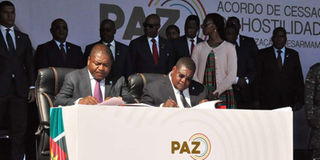Mozambique marks 28 years of peace deal with violence

This handout photo taken and released on August 1, 2019 shows Mozambique's President Filipe Nyusi and Renamo leader Ossufo Momade signing a ceasefire agreement in Gorongosa.
What you need to know:
- The southern African country has sought support from the European Union and other African states to stop the violence in Cabo Delgado province.
- The country's main opposition party has pointed the finger at the ruling Frelimo, accusing it of promoting political intolerance and questioning the disarmament process saying it is not clear and transparent enough.
Police in Mozambique’s Niassa province are downplaying an incident in which an armed group killed a driver and robbed passengers, even as the country marks 28 years of a peace accord marked with incessant violence.
The incident in Mavago district saw a passenger vehicle attacked as it made its way to Lichinga, the provincial capital in the west of the country, near Lake Malawi.
Mr Alfredo Coane, a police officer in Niassa province, told a local Radio that the attack had no link to the insurgence in Cabo Delgado province.
But that attack happened on October 4, 2017 - the third anniversary of the first ambush by the insurgents in Cabo Delgado. Mozambique celebrated the day by calling for peace and reconciliation.
October also marks 28 years since the signing of the peace accord in Rome between the government and Renamo, the main opposition party, that put an end to 16 years of civil war.
Since 1992, there have been three other peace accords in Mozambique, all of which have failed to be fully implemented. The most recent one was signed last August.
Islamist insurgency
Located about 1,663 kilometres north of capital Maputo, Cabo Delgado boasts of gold, tourmaline and many other minerals, and multinationals Exxon Mobil and Total engage in oil and natural gas projects there.
The province, which is 77,887 square kilometres big, has a population of 1,800,196 and 16 districts.
Since October 2017, violence has spread in the province, leaving in its wake some 1,500 people dead and 250,000 displaced.
The province, which borders Tanzania, has been the scene of an Islamist insurgency. Mozambique has been battling the rebellion since 2017, by a group calling itself Al-Shabaab.
The insurgents have been attacking villages and members of the security forces and reports show they may include foreign fighters from as far as Tanzania and Kenya.
Last week, the country’s cooperation and foreign affairs minister, Ms Verónica Macamo, confirmed the southern African country has sought support from the European Union and other African states to stop the violence in Cabo Delgado.
And on Sunday, President Filipe Nyusi defended reinforcement of state forces to address the violence in the province.
As part of the peace deal with Renamo, President Nyusi’s government agreed to gradually disarm the fighters of the opposition movement until June 2021, targeting about 5,000 of them.
So far, some 1,000 of them have surrendered their arms in exchange for amnesty and gradually inclusion in the civil government, the President said in an effort to stop violence.
“Unfortunately, we celebrate 28 years of the peace accords with sorrow because part of the population in Cabo Delgado, Sofala and Manica provinces still lives the nightmare of armed violence”, Mr Nyusi said in his address to the nation.
“The insurgents, whose motivations are unknown, are carrying out the threat spread strategy, life marginalisation and human rights violation”.
Opposition’s criticism
Meanwhile, the country's main opposition party has pointed the finger at the ruling Frelimo, accusing it of promoting political intolerance and questioning the disarmament process saying it is not clear and transparent enough.
Renamo has also condemned the violence in the north and centre of the country, adding nothing justifies violence when the focus should be development, peace and national reconciliation.
In August, Mozambique civil society groups demanded adequate investigations after a video emerged of a woman being mutilated by people believed to be personnel of the Mozambican Security and Defence Forces.
In the video widely circulated on social media, the naked and unarmed woman is beaten up minutes before her killing.
The video does not have a location or date but activists say the incident took place in northern Mozambique.
Two men are heard saying in Portuguese Al-Shabaab has already been finished”.
Also in August, Amnesty International (AI) alerted Mozambicans officials to launch an independent investigation after verifying gruesome video footage showing detainees being beaten in Cabo Delgado province.
The country’s government denied the accusations of torture and other human rights violations in Cabo Delgado, where the military is attempting to end an insurgency, adding that the statement by AI was aimed at degrading the image of our security and military forces.





